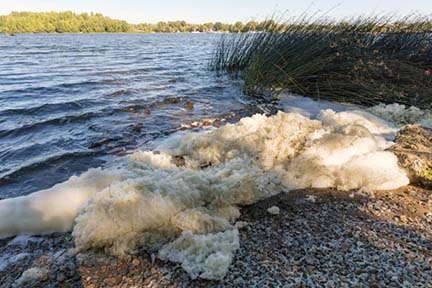Press Release FOR IMMEDIATE RELEASE: May 16, 2025 CONTACT: Laina Stebbins, 517-241-2112, StebbinsL@michigan.gov MDHHS recommends Michigan residents LANSING, Mich. – With summer approaching, the Michigan Department of Health and Human Services recommends Michigan residents and visitors avoid foam on Michigan lakes, rivers, streams and other surface waters. Foam can form on any body of water. It can be white, off-white or brown; have an earthy or fishy scent; and pile up in bays, eddies, dams or other river barriers. Sometimes foam can contain harmful chemicals or bacteria. This can include high levels of per- and polyfluoroalkyl substances (PFAS). Some studies have found that high exposure to some PFAS is linked to high cholesterol and liver damage, among other health effects. If you touch any foam, rinse off or bathe as soon as possible. This is especially true if the water is suspected to be contaminated with PFAS. Touching foam without rinsing off or bathing can lead to accidentally swallowing foam and its contents. “The risk of PFAS exposure through your skin is low. However, you can accidentally swallow PFAS, as well as bacteria, algae, viruses and other chemicals, if you do not rinse off or bathe after touching foam,” said Dr. Natasha Bagdasarian, chief medical executive. “Rinsing off or bathing after water activities will help protect you, your family and your pets from harmful substances that may be in foam or water.” The Michigan Department of Agriculture and Rural Development also recommends people keep their animals from touching or swallowing foam on bodies of water. Animals can swallow foam that has built up in their fur when grooming themselves. If animals touch foam, they should be rinsed off and bathed with fresh water. Pet owners with questions related to animals and foam should contact their veterinarian. For more information about PFAS concentrations and bacteria that can be found in foam in Michigan, see the 2021 Surface Water Foam Study. Anyone with questions about exposure to PFAS or foam can call the MDHHS Environmental Health Hotline at 800-648-6942. More information about PFAS on surface water is available at FAQ: PFAS foam on lakes and streams. |


